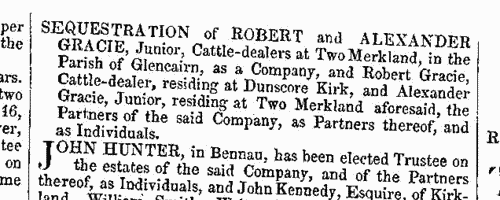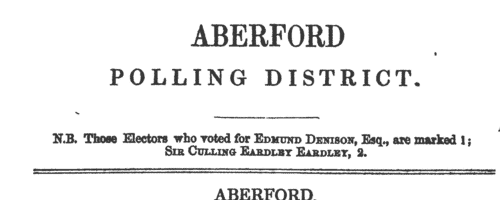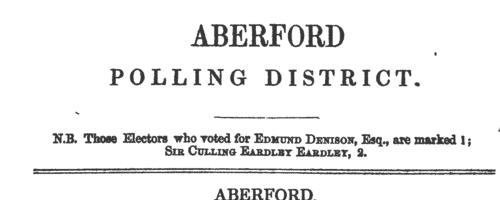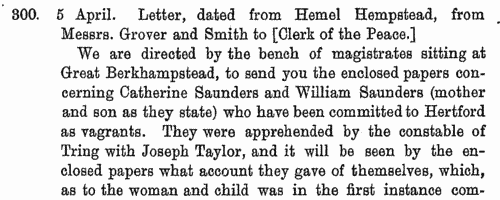Carrol Surname Ancestry ResultsOur indexes 1000-1999 include entries for the spelling 'carrol'. In the period you have requested, we have the following 106 records (displaying 51 to 60): Single Surname Subscription | | | Buying all 106 results of this search individually would cost £598.00. But you can have free access to all 106 records for a year, to view, to save and print, for £100. Save £498.00. More... |
These sample scans are from the original record. You will get scans of the full pages or articles where the surname you searched for has been found. Your web browser may prevent the sample windows from opening; in this case please change your browser settings to allow pop-up windows from this site.  Persons of standing recommending London police recruits
(1830-1842) Persons of standing recommending London police recruits
(1830-1842)
The Metropolitan Police Register of Joiners (MEPO 333/4) lists policemen joining the force through to 31 December 1842 (to warrant number 19892). The register is alphabetical, in so far as the recruits are listed chronologically grouped under first letter of surname. It is evidently a continuation of a similar earlier register, not closed until its alphabetical sections were filled: consequently, there are no entries in this register for the initial letters N, O, Q, U, V, X, Y or Z; and the sections of this register start at different dates - A 18 April 1840 (warrant number 16894); B 11 December 1830 (5570); C 7 September 1830 (4988); D 27 May 1833 (8445); E 15 December 1838 (14476); F 30 March 1832 (7372); G 1 December 1835 (11,184); H 25 April 1832 (7457); I and J 13 February 1837 (12449); K 2 January 1838 (13457); L 3 October 1834 (9905); M 15 November 1832 (7999); P 4 October 1831 (6869); R 4 September 1837 (13021); S 30 March 1835 (10366); T 6 April 1840 (16829); W 30 December 1833 (9096). The register gives Date of Appointment, Name, Number of Warrant, Cause of Removal from Force (resigned, dismissed, promoted or died), and Date of Removal. Those recruits not formerly in the police, the army, or some government department, were required to provide (normally) at least two letters of recommendation from persons of standing, and details of these are entered on the facing pages: the names in these are indexed here (the police recruits are indexed separately and not included here). Recruits transferred from other forces or rejoining the force did not normally need recommendations - in the latter case, former warrant numbers are given - but some recommendations are from police inspectors, even other constables. Recruits coming from the army sometimes have general military certificates of good conduct, but most often have a letter from their former commanding officer; recruits recommended by government departments (most often the Home Office) similarly have letters from the head of department. But the great majority of the names and addresses in these pages are of respectable citizens having some sort of personal acquaintance with the recruit. Where more than two recommendations were provided, the clerk would only record one or two, with the words 'and others'. Tradesmen are sometimes identified as such by their occupations; there are some gentry. Although the great bulk of these names are from London and the home counties, a scattering are from further afield throughout Britain and Ireland. CARROL. Cost: £8.00.  | Sample scan, click to enlarge

| North Tipperary Jurors: Nenagh: March 1842
(1842)
'Names of the petty jury to try between our Sovereign Lady (Queen Victoria) and the Traversers, at a General Assizes and Gaol Delivery, held at Nenagh, in and for the North Riding of the County of Tipperary, on Monday the 14th day of March 1842'. The list gives: full name; parish or place of abode; and occupation (such as esquire, gentleman, or merchant). CARROL. Cost: £6.00.  | Sample scan, click to enlarge

|  Merchant Seamen
(1835-1844) Merchant Seamen
(1835-1844)
At this period, the foreign trade of ships plying to and from the British isles involved about 150,000 men on 15,000 ships; and the coasting trade about a quarter as many more. A large proportion of the seamen on these ships were British subjects, and so liable to be pressed for service in the Royal Navy; but there was no general register by which to identify them, so in 1835 parliament passed a Merchant Seamen's Registration Bill. Under this act a large register of British seamen was compiled, based on ships' crew lists gathered in British and Irish ports, and passed up to the registry in London. A parliamentary committee decided that the system devised did not answer the original problem, and the register was abandoned after less than two years: the system was then restarted in this form, with a systematic attempt to attribute the seamen's (ticket) numbers, and to record successive voyages. The register records the number assigned to each man; his name; age; birthplace; quality (S = seaman, &c.); and the name and official number of his ship, with the date of the crew list (usually at the end of a voyage). Most of the men recorded were born in the British Isles, but not all. The system was still very cumbersome, because the names were amassed merely under the first two letters of surname; an attempt was made to separate out namesakes by giving the first instance of a name (a), the second (b), and so on. In this volume the register is restarted from 1840 onwards, with the mariner's previous number (if any) being entered in the column after his birthplace. In the event of it becoming known that a man had died during the course of a voyage, that information is written across the remaining empty columns. This volume (BT 112/11) covers mariners whose surnames start with Ca (and McCa).CARROL. Cost: £8.00.  | Sample scan, click to enlarge

| The Edinburgh Gazette
(1846)
The Edinburgh Gazette is the official publication in which various Scottish legal notices are issued, as well as promotions and casualty lists for the British army as a whole, and brief lists of English bankrupts. The key source for tracing details of Scottish bankruptcies, insolvencies, and dissolutions of business partnerships.CARROL. Cost: £6.00.  | Sample scan, click to enlarge

| New South Wales Intestates
(1847)
The probate courts of the Australian colonies furnished returns of estates of deceased intestates, giving full name, colonial residence, supposed British or foreign residence of family (often unknown, or left blank), amount of the estate and how much had been disbursed and how. The date of death is often stated, and if by accident, suicide or crime. Names were carried forward from return to return until the estate was expended or exhausted. CARROL. Cost: £6.00.  | Sample scan, click to enlarge

| Electors for Norland
(1848)
On 14 and 15 December 1848 an election took place for a Knight of the Shire for the West Riding of Yorkshire in the House of Commons. The candidates were Edmund Denison and sir Culling Eardley Eardley, gaining 14,743 and 11,795 votes respectively. The county franchise at this period included freeholders of land worth 40s or more a year; £10 copyholders and long-leaseholders; and £50 short-leaseholders and tenants. This poll book was published in 1849.
Former poll books had been compiled from the sheriff's returns; but as these were now transmitted to the Home Office immediately after an election, in this instance the polling was marked from the check-clerk's returns, carefully compared with the registers marked in the poll booths at the time of voting.
The votes for the respective candidates are indicated by the numerals 1 (Denison) and 2 (Eardley). The omission of these numerals indicates that the elector did not vote. Many names which appear on the register of particular townships are completely omitted in this poll book: in all these cases, the same name will be found recorded in some other township, the elector having two or more qualifications. In such cases, his name only appears in the poll book in the actual township for which he chose to vote; or, if he did not vote at all, in that township for which he was qualified that lay closest to his actual residence.
The townships are arranged alphabetically within polling district; and within each township the names are arranged alphabetically by surname and christian name, and the elector's residence is given. Many of the electors resided outside the township for which they were qualified - some in other counties. Moreover, at the end of each polling district there is a list of persons registered to poll in that district, from townships is other districts. CARROL. Cost: £6.00.  | Sample scan, click to enlarge

| Electors for Skircoat
(1848)
On 14 and 15 December 1848 an election took place for a Knight of the Shire for the West Riding of Yorkshire in the House of Commons. The candidates were Edmund Denison and sir Culling Eardley Eardley, gaining 14,743 and 11,795 votes respectively. The county franchise at this period included freeholders of land worth 40s or more a year; £10 copyholders and long-leaseholders; and £50 short-leaseholders and tenants. This poll book was published in 1849.
Former poll books had been compiled from the sheriff's returns; but as these were now transmitted to the Home Office immediately after an election, in this instance the polling was marked from the check-clerk's returns, carefully compared with the registers marked in the poll booths at the time of voting.
The votes for the respective candidates are indicated by the numerals 1 (Denison) and 2 (Eardley). The omission of these numerals indicates that the elector did not vote. Many names which appear on the register of particular townships are completely omitted in this poll book: in all these cases, the same name will be found recorded in some other township, the elector having two or more qualifications. In such cases, his name only appears in the poll book in the actual township for which he chose to vote; or, if he did not vote at all, in that township for which he was qualified that lay closest to his actual residence.
The townships are arranged alphabetically within polling district; and within each township the names are arranged alphabetically by surname and christian name, and the elector's residence is given. Many of the electors resided outside the township for which they were qualified - some in other counties. Moreover, at the end of each polling district there is a list of persons registered to poll in that district, from townships is other districts. CARROL. Cost: £6.00.  | Sample scan, click to enlarge

| New South Wales Intestates
(1848)
The probate courts of the Australian colonies furnished returns of estates of deceased intestates, giving full name, colonial residence, supposed British or foreign residence of family (often unknown, or left blank), amount of the estate and how much had been disbursed and how. The date of death is often stated, and if by accident, suicide or crime. Names were carried forward from return to return until the estate was expended or exhausted. CARROL. Cost: £6.00.  | Sample scan, click to enlarge

| New South Wales Intestates
(1849)
The probate courts of the Australian colonies furnished returns of estates of deceased intestates, giving full name, colonial residence, supposed British or foreign residence of family (often unknown, or left blank), amount of the estate and how much had been disbursed and how. The date of death is often stated, and if by accident, suicide or crime. Names were carried forward from return to return until the estate was expended or exhausted. CARROL. Cost: £6.00.  | Sample scan, click to enlarge

| Hertfordshire Sessions
(1699-1850)
Incidents from the Hertfordshire Sessions Rolls. These cover a wide range of criminal and civil business for the county, with presentments, petitions, and recognizances to appear as witnesses: many of the records concern the county authorities dealing with regulation of alehouses, religious conventicles, absence from church, highways, poaching, profanation of the Sabbath, exercising trades without due apprenticeship &c. Unlike the Sessions Books, the decisions of the justices are not recorded on the rolls, which serve more as a record of evidence and allegations. This is a calendar of abstracts of extracts: it is by no means a completely comprehensive record of the surviving Hertfordshire sessions rolls of the period, but coverage is good. CARROL. Cost: £4.00.  | Sample scan, click to enlarge

|
Research your ancestry, family history, genealogy and one-name study by direct access to original records and archives indexed by surname.
|













